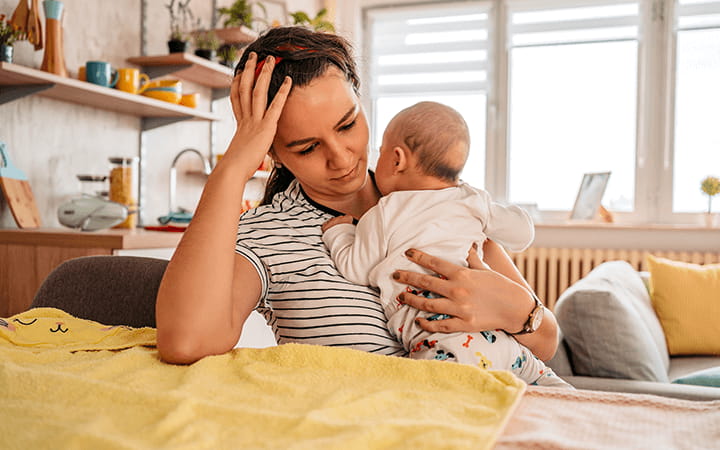When Worrying About Your New Baby Becomes a Sign of Postpartum Anxiety
May 04, 2022

The birth of a new baby is usually a time of joy and happiness. But it is also a time of great change – which can evoke a variety of other emotions, including worry and anxiety.
It is normal to worry about your newborn; after all, caring for a tiny, new human is a big responsibility and you want to do everything in your power to keep your baby safe. But when these worries start to occupy every waking moment and even keep you up at night, it may be a sign of a more serious anxiety disorder.
Signs and Symptoms of Postpartum Anxiety
Postpartum anxiety is anxiety that is experienced in the first 12 months after giving birth. It can include a variety of different symptoms, including pervasive worrying thoughts that are intrusive, explains University Hospitals psychologist and women’s behavioral health expert Erika Kelley, PhD.
Often, the anxiety and worry centers around the health and safety of your baby, such as intrusive “what if” thoughts about harming yourself or the baby. These thoughts are often “catastrophic” – meaning they tend to be about imagining the worst-case scenario (i.e., something terrible happening to your baby). These kinds of thoughts are very common and reflective of how overwhelming the responsibility of caring for a fragile infant can feel, Dr. Kelley says.
“A lot of women experience scary thoughts in the postpartum period. But when these thoughts become intrusive and preoccupying, you can't get them out of your mind or you notice that they start to affect your behavior,” says Dr. Kelley.
In addition to worrying thoughts, physical symptoms often accompany postpartum anxiety, says Dr. Kelley. These include feeling restless, anxious, on edge, increased heart rate and shortness of breath.
What Causes Postpartum Anxiety?
There are a variety of factors that may trigger postpartum anxiety. These can include hormonal changes, including a significant drop in estrogen and progesterone during the postpartum period. A family or personal history of anxiety disorders will also put you at a higher risk of developing postpartum anxiety. Environmental stressors can also contribute to anxiety episodes during the postpartum period – and don’t forget sleep deprivation.
Postpartum Anxiety vs. Postpartum Depression
You have likely heard of postpartum depression; it is the most common postpartum mental health disorder, affecting about one in seven new moms. There is some overlap in symptoms between postpartum depression and anxiety, including difficulty sleeping and irritability. While women with postpartum depression may experience anxiety as well, not all women with postpartum anxiety experience depression.
Both conditions can be distinguished from the “baby blues”, when changing hormone levels can make you feel sad and overwhelmed, or tearful and emotional without necessarily feeling sad. Baby blues symptoms are generally mild and disappear after a couple of weeks, while postpartum anxiety and depression are more pervasive and persistent.
Dr. Kelley says it’s important to discuss all your symptoms with your healthcare professional to get the correct diagnosis, as this will determine which types of treatment will be most effective.
Treatment for Postpartum Anxiety
The good news is that there are a variety of treatments that are available to treat postpartum anxiety. Dr. Kelley recommends seeking help and assistance at the first signs of postpartum anxiety. With proper treatment, most women will recover from their anxiety episode after the postpartum period.
Because there are a variety of anxiety types, it is important to discuss the specific symptoms you are experiencing with your healthcare professional. For example, you might be experiencing obsessive thoughts, uncontrollable worry thoughts, or you might be experiencing panic attacks or feeling physically anxious all the time.
Treatments include:
Psychotherapy. Cognitive behavioral therapy will focus on identifying those negative, distressing or frightening thoughts and helping you to retrain your thinking to be more realistic and focus on the present moment with your baby. Additionally, cognitive behavior therapy often includes relaxation training. This will help reduce the physical tension and psychological arousal that is happening in your body. The goal is to help you feel more in control and to regain control of the muscle tension in your body and to feel calmer as a parent.
Medication. Medications often include antidepressants such as serotonin reuptake inhibitors (SSRIs), which can help increase the neurochemical serotonin in your brain, which is important for reducing depressed mood. Sometimes, benzodiazepines may be given in the short term if a new mother is extremely anxious.
Although you may still breastfeed while on some antidepressants, it is important to note your breastfeeding status when considering any medication and make sure that you are talking with your healthcare professional about possible side effects on breastfed babies.
Tips for Managing Anxiety Symptoms
Some other ways to manage the symptoms of postpartum anxiety include:
- Prioritizing sleep – this may involve sleeping in shifts or allowing your partner (or other family/support person) to take over one or more overnight feedings
- Getting more physical activity (if medically cleared to do so) – exercise such as yoga can be an excellent anti-anxiety and relaxation technique
- Reaching out for help – Don’t be afraid to ask for help from your support system when things become overwhelming. Even something as simple as providing a meal or throwing in a load of laundry can help ease the burden.
- Focus on just one or two trusted sources of information – Dr. Kelley says relying on information from your pediatrician or a favorite parenting book is more beneficial and less likely to trigger anxiety than going down a Google rabbit hole when seeking advice.


